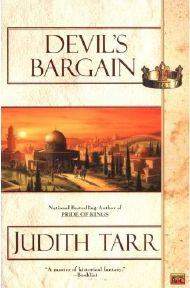

Judith Tarr, Devil's Bargain
For the sake of completeness, I forced myself to read through this historical fantasy. I can't get angry about it because it is, frankly, too, too silly for words. It should have been titled Mary-Sue on Crusade - because that's what it is.
Sioned is the violet-eyed and sultry, pagan Welsh Mary-Sue heroine (Henry II's bastard daughter). Conrad's jealous mistress says of her, "Your eyes are more unusual than mine, and your skin is fairer. You're even more beautiful than rumor made you." Richard, too, tells her she's more beautiful than his full sister, Joanna, the dowager Queen of Sicily, and most of the male characters fall in love/lust with her. Of course, if the author had translated her name, it would be a cognate of Joanna, a somewhat less glamorous Janet... So she is, in some respects, a fantasy substitute for Joanna, since she eventually marries 'al-Adil, to whom Richard had offered to marry Joanna.
Eleanor is a sorceress. Saladin's brother 'al-Adil is Mary-Sue Sioned's lover, and a sorcerer. Conrad is, of course, the stereotyped swarthy, scheming Latin baddie, and is dwarfed by his wife, Isabella, here a strapping blonde. The Mary-Sue heroine tries to vamp him to get information from him for Richard. However, he has a mistress, a pagan princess of the old royal house of Tyre, Elissa (i.e. Dido). When Mary-Sue Sioned is unjustly arrested for murder by Conrad, 'al-Adil raises the jinn to get her out of jail, faster than you can say deus ex machina. Sinan, chief of the Assassins, is an evil sorcerer, who wants Richard's soul.
Saladin is killed by the Assassins. Richard conquers Jerusalem and is crowned king (Isabella having joined a convent). Sinan is defeated and destroyed (but returns in the sequel). And apparently it's more acceptable for 'al-Adil to marry an unbaptised Mary-Sue pagan than a Christian...!!! (He's OK with it, "so long as she's reasonable about the children.") She also seems to think that only mediæval Christianity disapproved of fornication, ignoring Islamic sexual mores on this.
The Mary Sue heroine's idea of what makes a good 12C ruler is hilarious, too. At one point, she tries to talk Henry of Champagne into becoming King (but he refuses, because he's unrequitedly in love with Mary-Sue Sioned (of course!) and doesn't want to marry Isabella!):
"You would make a good king," she said. "Better than Conrad. You're younger; prettier. People love you. You know how to lead them and how to command them."
OK, let's reel back to the beginning of that for a moment. Being "young and pretty" is a qualification for mediæval kingship? The job is "king" - not "male model"!
Tarr's justification for the book is:
...unlike the fictional stories which it otherwise so closely resembles, [the Third Crusade] dribbles away at the end. There is no satisfying conclusion, not even a grand defeat.
There is, at least, no risk anyone sane would mistake this novel for reality, but it does seem utterly perverse to use real historical characters in this way. Staying on as King of Jerusalem himself was never Richard's plan - what about the Angevin empire? Although she claims to have used Lyons and Jackson’s Saladin: The Politics of Holy War as her main source for the Muslim side, her treatment of the Muslim characters, and especially of the Nizari, is peculiar, to say the least, if not downright irresponsible. She seems to regard the Nizari as supernatural figures in several of her novels. (Does no-one ever read Farhad Daftary on the subject?!)
Back to
TOP


